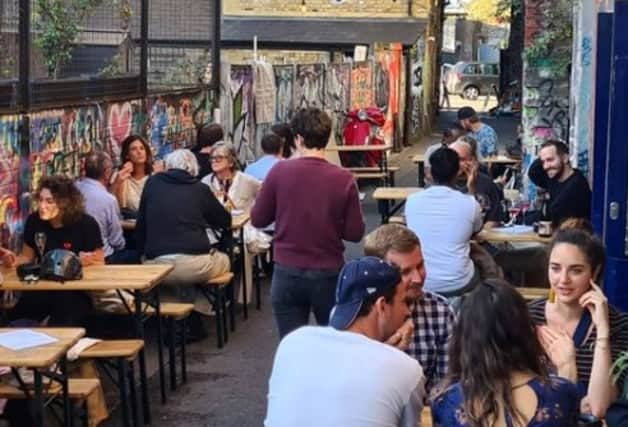Renegade Urban Winery - Meet the trailblazing owner who brought urban wine making to London


I’m at Renegade’s new winery in Tottenham and my feet are feeling pretty peeved. Not only are they not getting to stamp on any grapes (which up until now I had always believed to be a fundamental part of winemaking), they are also having to bear my weight while my hands get all the excitement.
Along with several other volunteers – all oenophiles, many with hobby vineyards – I spend five hours up to my elbows in sticky grape juice. Our sole job at this early stage in the production process is to massage tonnes of grapes over a wire net so that they fall off their stems and into a skip. Once full, the fruits of our labour are forklifted into the air and tipped into a giant metal still where they will be left to ferment over a boozy month.
It’s meditative, mesmerising and knackering work, fuelled by Yardsale Pizza and Five Points craft beer – more than enough payment in my books.
We’re working shoulder to shoulder with the Renegade team, wine maker Andrea Bontempo, originally from Italy’s Prosecco region, and straight-talking owner, Warwick Smith.
Smith spent 15 years working in asset management before doing a complete career U-turn to open Renegade in a railway arch in Bethnal Green in 2016. Although the urban winemaking trend had caught on in New York, California and parts of Europe, London was lagging miles behind. Despite high overheads and logistical difficulties (think big trucks and narrow alleys), Smith believes London is a natural place for winemaking.
‘People in London like things made locally with love and care and are prepared to pay more for them – just look at the craft beer revolution. Londoners are naturally open minded, and I think they like the honesty of what we do.’
Renegade’s taproom is located in the Bethnal Green winery itself, with tables squeezed between the stills. As we work our way through crates and crates of pinot noir grapes from Lombardy, Smith explains why they’ve moved to this airy warehouse in Tottenham.
‘We’ll still be aging wines at the old place and the taproom will still be running, but we were at maximum capacity. We didn’t even have drains there and it was a nightmare during harvest time trying to keep it neat enough for customers without compromising our productivity. Now we’ll be able to make around 100 barrels, double our previous production.’
Although Renegade is known for experimental techniques such as combining fruit from different countries – far from an industry norm – Smith is adamant that the thing that matters more than any ‘poncey technique’ is the quality of the fruit.
The company relies on relationships built over time with small, family-run operations in Bordeaux, south west Germany, Italy, Albania and even the high-altitude vineyards just outside Barcelona.
‘We’re the only winery in the UK that exclusively uses organic, hand-harvested grapes from all over Europe. We don’t care where they’re from as long as they’re brilliant. The wines we make entirely depend on what grapes come in that day and what mood we’re in.’
After several hours of de-stemming, my hands look as if I have personally been involved in a massacre; the less said about my white t-shirt the better. It’s tiring work, so when Smith casually mentions he actually could have afforded an automatic de-stemmer this year but decided not to, I can hardly believe what I’m hearing.
But when he explains that grapes that are de-stemmed by hand create brighter, more aromatic reds because the berries ferment as whole fruit, I realise that this is just an extension of Renegade’s whole philosophy.
They’d rather rely on wine-loving volunteers and techniques that take literally ten times as long than compromise on the quality of their wine. It may make little sense from a business perspective, but its a philosophy I’m more than happy to raise a glass to.
To find out more about volunteering, visit Renegade’s website.